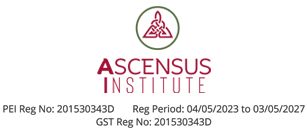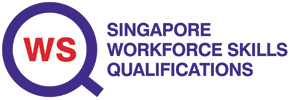Diploma in Hospitality and Tourism Management
Overview
Professionals who possess the ability to influence organizational performance are in high demand in today's fiercely competitive, digitalized, and interconnected world. By enrolling in the Diploma in Hospitality and Tourism Management program at ASCENSUS INSTITUTE, learners (students) will acquire a solid foundation in business, a comprehensive understanding of digital skills and related management skills tailored to the demands of the digital era, and a holistic perspective. This course will also support learners (students) in fostering an entrepreneurial mindset.
Modules
1. Marketing Fundamentals (Core Module)
In any event, everyone in a firm needs to be aware of its marketplace operations because they are all directly responsible for finding, connecting with, and satisfying customers.
This module provides a thorough introduction to the role marketing plays within organizations, including fundamental marketing principles, practices, and strategies.
Learners (students) are given the opportunity to become familiar with the marketing funnel, its stages, and delivery. They will be able to put essential marketing principles into practice in a real-world situation.
2. Business Calculations (Core Module)
It is fundamental for businesses to monitor financial situations for decision-making. To achieve financial sustainability and ensure the business's financial health, businesses have systems in place to plan and monitor their business activities.
This module provides fundamental knowledge of performing business calculations using financial data, which serves as input for financial decision-making.
The learners (students) will have the opportunity to explore different ways of investing money over time to generate value, utilizing various emerging FinTech applications.
3. Digital, Academic and Professional Skills (Core Module)
Digital skills are necessary to demonstrate professional competency, exhibit effective production skills, reflect on career development, list "soft" skills, and develop knowledge and skills in discerning professional and personal qualities in corporate interactions and teamwork.
The learners (students) will have the opportunity to develop basic professional "soft" skills such as critical thinking, communication, and team building to meet present and future organizational requirements.
4. Travel and Tourism Operations (Core Module)
Studying Travel and Tourism Operations provides learners (students) with a comprehensive understanding of the industry's structure and components, encompassing its various sectors, trends, and challenges.
This module aims to equip learners (students) with a broad range of knowledge and skills that are essential for success in the exciting and dynamic travel and tourism industry.
Learners (students) will gain insights into the different types of tourist markets and their characteristics, including domestic and international markets, leisure and business travel, and niche markets. Additionally, they will develop an understanding of the importance of risk management and safety in the travel and tourism industry, including implementing measures to ensure the safety and security of travellers.
5. Hospitality Management (Core Module)
Studying Hospitality Management equips learners (students) with a deep understanding of the hospitality industry, encompassing its structure, sectors, trends, and challenges. They gain familiarity with a diverse range of hospitality products and services, including lodging, food and beverage, and events. This enables them to comprehend the unique aspects of each segment.
Furthermore, the module provides learners (students) with a broad range of knowledge and skills that are essential for success in this exciting and dynamic industry.
6. Industrial Attachment (6 months Internship) (Subject to placement availability) (Elective Module)
Industry experience is often an advantage or even crucial when applying for a full-time job. Employers frequently prefer candidates with previous experience in roles that may be similar to the one they are offering. An internship can provide valuable professional growth opportunities and help learners (students) determine whether their chosen career path is suitable while still in school.
An internship, which is a short-term work experience provided by businesses and other organizations, aims to expose individuals, typically learners (students), to a specific industry or profession. Both work and learning are equally important during this period. Ideally, interns should use their time to work on projects relevant to their field, gain knowledge about the industry, establish professional networks, and develop soft skills. In some cases, internships even lead to offers of full-time employment.
In this six-month internship, learners (students) are given the opportunity to acquire skills that can be applied in future careers. Internships can be paid or unpaid.
7. Final Written Project (Alternative to the internship) (Elective Module)
The final written project is similar to a capstone project, which is a physical stone set above a building or wall to signify the successful completion of construction, emphasizing its significance.
It is a notable and well-known final project that comes after successfully completing all the academic requirements of a course. Thus, it is widely regarded as the most significant assessment throughout the course of study.
The final project incorporates prior learning and experience to aid in information gathering and analysis. It synthesizes data into a fresh interpretation that could be useful for the discipline or make a contribution to the profession.
Who Should Attend?
• Company-funded employees who are required to upskill to support the work functions at the workplace.
• Individual who is seeking a course to upskills for a career progression or employability.
• School graduates looking to progress into a higher learning education.
Entry Requirement
• 17 years old
• Attainment of IELTS 5.0 or equivalent, or
• A pass in ASCENSUS INSTITUTE’s English Literacy Test with a minimum grade of 60%.
Normal Entry:
• Completed NITEC, or
• Higher NITEC, or
• At least 1 pass with a minimum C6 for GCE ‘O’ Level, or
• Completion of High School (9th year) qualification or equivalent for International Students
Alternative Entry:
Applicants with the minimum age of 30, who do not possess the above qualifications but have a minimum of 8 years working experience, may be considered for entry into this course.
Evidence of previous employment will need to be provided, together with a reference from the current or recent employer.
Graduation Requirement and Award
Obtained a passing mark with “C-” grade in all core modules and successfully completed one of the elective modules. i.e., 5 core modules and 1 elective module.
Duration
Full-time: 6 months
Part-time: 9 months
Industrial Attachment:
• Duration: 6 months
• Alternative to the Industrial Attachment: A final written project to be submitted within 2 months upon receiving of the project outline.
Teacher : Student Ratio - 1 : 40
Possible Progression
Upon successful completion of the course, learners (students) may progress into an Advanced Diploma in Hospitality and Tourism Management course, subject to meeting the entry requirements of the school.
Intakes
Monthly
Fees
Non-refundable Application Fee: S$218 w/GST (S$200 w/o GST)
Course Fee: S$5,886.00 w/GST (S$5,400.00 w/o GST)



